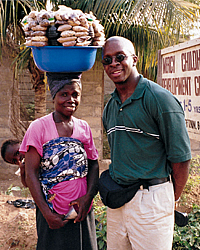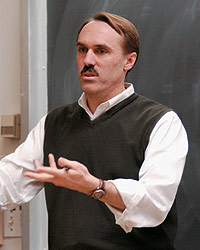| Globe-trotters
Emerging markets are enticing more MBAs whose expertise
can make a dramatic difference in far-flung regions of the
world. Kellogg is marshaling a variety of resources to give
students the skills needed to succeed in this international
business adventure.
By Daniel Cattau
When Leslie Flagg graduated from the Kellogg School of
Management 12 years ago, the concept of emerging markets
had not yet
truly emerged; the most adventurous Kellogg students headed
off to Russia for two weeks of field research in the school’s
fledgling Global
Initiatives in Management (GIM) program.
“The whole idea of working abroad — whether for corporate
America or international development — was novel, or
really crazy, because the U.S. market was great. Everyone
received two to five [job] offers, consulting was hot and
Procter and Gamble was heaven,” she says.
But Flagg, now deputy team leader and agribusiness
specialist with Chemonics International in Abuja, Nigeria,
was determined
to do something different and make a difference. Her
aunt refers to her as a “capitalist with a cause.”
 |
|
| While at Kellogg, George Scott ’99
lent his management leadership to the Mercy Childhood
Development Centre in
Ghana as part of the Kellogg Global Initiatives in Management
Program. |
|
| |
|
After Kellogg, Flagg was awarded
a Tuskegee University fellowship to work in Africa
for nine months
and ended
up staying 12
years — and counting. She started in Ghana
working for a US AID-funded project that, quite literally,
went nuts
under her direction.
“The way I look at it, if you can make
a difference, a sustainable difference, in a foreign country,
you’ve done a lot,” Flagg
says. “For example, we identified cashew as a growing
opportunity for poverty alleviation and profit while in Ghana.
After 10 years, farmers and private sector players are still
making money in Ghanaian cashew.”
When asked about the difficulties of living
in Africa, the 1991 Kellogg alum says: “Challenges are relative. Some
would say that living and working in Nigeria is a challenge,
but I feel being unemployed in the United States in this
current environment is more of a challenge.”
International flair
Kellogg is an international community, with an
alumni network spanning the globe and a diverse
faculty
and student body
bringing a rich multicultural perspective to
the study of business leadership. Increasingly, that
community
is expanding.
Students are looking at international careers
not
only as a way of doing well, but also doing good.
International business is one of the most
popular majors at the school, augmented by such research
institutions
as the Kellogg
Center for International Business.
The Kellogg School network includes an increasing
number
of alumni
in
emerging markets, including Turkey’s economic minister,
Ali Babacan ’92; Thailand’s deputy prime minister,
Somkid Jatusripitak ’84; and the governor of the Afghan
Central Bank, Anwar Ahady ’83.
The GIM program, initiated in 1990, attracts
about 240 full-time students each year to
the course
which culminates
in two
weeks of intensive field research in one
of a dozen countries, ranging from China and Vietnam,
to Chile
and Peru. Coordinated
by faculty advisers and Kellogg students,
these courses include 10 weeks of classroom preparation
for the
in-country research
trip, which involves meeting top government
officials
and senior business leaders.
Faculty advisers Mark
Finn and Anu Dayal-Gulati say that while many students
focus on traditional business issues, there is a strong interest
in corporate responsibility, such as how pharmaceutical companies
address the HIV/AIDS crisis. As part of the GIM course, Kellogg
students have studied such issues as possible remedies to
the mother-to-child transmission of HIV in South Africa and
AIDS prevention through marketing in Ghana.
“
Our students are interested in emerging markets almost by
definition because they’re interested in new directions
in business,” says GIM program director Finn, who is
also associate professor of accounting and international
business. “The students don’t
necessarily want to study insoluble problems.”
Emerging markets
are easy to spot — China, India, Vietnam,
South Africa, Brazil and Chile to name a few — but
more difficult to define. Generally,
emerging markets have demonstrated
consistently high growth rates,
even exceeding
that of developed countries. They
also typically promise greater
untapped economic
opportunities (though any country
theoretically demonstrates similar
potential).
At Kellogg, interest
in emerging
market careers is increasing, despite
such challenges
as
terrorist threats, the SARS
outbreak in Asia, and a few problematic,
if not plummeting,
economies.
Those who have fashioned international
careers out of their Kellogg experiences
believe
the downturn in the
U.S. economy
might lead a new group of entrepreneurs
and adventurers to careers overseas.
Special leadership to meet emerging
demands
Mariann Kurtz Weber ’92 recently moved from Sarajevo,
Bosnia, to Washington, D.C.,
with the International Finance Corp., the private sector
arm of the
World Bank (see Kellogg
World, spring 2003). She is program
manager of Linkages, which helps IFC spread the effects of
its investments
in
larger companies to smaller businesses.
Kurtz has her share of Balkan
war stories, and the advice
she imparts
to today’s
students is geared toward survival.
She suggests that MBAs must
now take a more
holistic approach
to finding their dream job,
especially given the current
economic realities
of the marketplace. Opportunities,
including ones in emerging
markets, are of course
still available to
those prepared to understand
and accept the challenges.
But Kurtz Weber says, “One has
to be cautious about the nature of the
work you engage in. You have to be clear
what are the potential trade-offs, hazards
and available
locales.”
For those interested in working
in emerging markets, she
adds, it’s important
to know that being a specialist
is not enough. Knowledge
of public policy, capital
markets
and banking systems all
help, she notes,
as does a grounding in
international crisis management.
 |
|
| © Nathan Mandell |
|
| Prof. Mark Finn directs the GIM program which gives Kellogg
students a hands-on leadership experience in emerging markets
around the world. |
|
| |
|
That is one reason why
crisis management is
becoming increasingly
prominent
at the Kellogg
School,
notes Finn. Kellogg is
placing more emphasis
on the subject through a variety
of
initiatives
that include enhancements
to the curriculum, such
as a new
course
that includes cross-cultural
situations.
In
addition,
Kellogg hosts a number
of leadership speakers
series
and conferences,
and CEO roundtables
that bring
senior executives
to campus to share their
insights with students.
“
We are continuously encouraging our students to ‘dig
deeper’ to understand
the complex demands
of leadership today,” explains
Kellogg School Dean
Dipak C. Jain. “One
area where we are now
focusing greater attention
is leadership challenges
within the government
sector — not
only in the United
States but around the
world. This initiative
is yet another way
Kellogg is preparing
its students to play
senior roles in
an array of professional
settings.”
In
interviews with students,
it’s clear that
altruism is rising
along with an awareness
of great overseas opportunities.
Tapiwa Mashingaidze ’04,
one of the founders
of the year-old Kellogg
Emerging Markets
Club (KEMC), cites a
Chicago-based
investment banker who
brokered a multi-million
dollar securitization
for the Africa Development
Bank, and then went
on to
own
a highly successful
Senegalese insurance
company.
“
There is a common misconception about careers in emerging
markets,” he says. “The idea seems to be that
an emerging markets career is an extension of the Peace Corps
. . . and offers the satisfaction of doing good, but few
of the other rewards to which we all aspire — like
cash.”
Even the socially
conscious Kellogg
students sometimes
believe a
career in emerging
markets precludes
a materially comfortable
life, Mashingaidze
says. “It really is not all about
the Peace Corps,” says Mashingaidze, a British-born
Zimbabwean. “Emerging markets problems
can be opportunities for both dreamers
and bankers.”
Opportunities abound
beyond investment
banking and
consulting. Manufacturing,
public health,
the environment
and high
technology are
all arenas holding
significant
promise
for MBAs
looking to make
a difference
abroad. Nongovernmental
organizations
(NGOs) and such multilaterals
as the
World
Bank and US AID
provide
other
options.
“
One of the most important trends in the world economy is
the internationalization of production,” says
Sergio
Rebelo,
Kellogg School
professor of
international
finance.
World exports
in 2001 amounted
to $7.4 trillion,
but production
by multinational
corporations
outside of
their country
reached
$18.5 trillion.
In the pharmaceutical
industry,
for instance, many
companies
find it
more efficient
to produce
in different
countries,
Rebelo says. “This decentralization
of production is very exciting because
it can lower costs and increase the
size of the market, raising the rewards
to innovation.”
Some Kellogg
students
are working
to
bring even
greater
awareness of emerging-market
opportunities
and education.
KEMC
President
Darren
Makarem ’04 says career
development is a key area of focus.
“
Partly in recognition of the increasingly stringent work
visa regulations in the United States, “it is desirable
to identify and foster relationships with companies and organizations
operating in emerging markets who may be able to offer students
nontraditional career paths,” he
says.
In addition,
Marcy
Shugert ’04 — a KEMC leader
who has studied HIV/AIDS education in South Africa, Thailand
and Australia — is
a proponent
of
expanding
the
Kellogg
international
course
offerings
and
case
studies
to
create
even
more
career
opportunities
in
emerging
markets.
Robert
A.
Korajczyk,
senior
associate
dean
for
academic
affairs
and
the
Harry
G.
Guthmann
Distinguished
Professor
of
Finance,
says
that
Kellogg “has an array of initiatives designed
to enhance students’ exposure to global issues in general,
and emerging markets issues in particular.” These
include
GIM
and
several
research
centers
that
support
faculty
research
on
global
issues,
such
as
the
Ford
Motor
Company
Center
for
Global
Citizenship.
In
addition, Korajczyk
says the
finance department
offers a
course titled
Major Project
and Project
Finance in
Emerging Markets.
More importantly,
he notes
that emerging
market issues
are being
covered with
greater frequency
in courses
not specifically
listed as
international classes.
“
Another important development,” Korajczyk says, “is
the creation of a task force whose mission is to study all
international issues faced by the school.”
Kellogg students,
no doubt, will
embrace these developments
and reap the
rewards of a curriculum that
helps
expand the global
footprint
of Kellogg and
its alumni network.
“
The more Kellogg can introduce the global into education,” says
Shugert, “the better prepared students will be in understanding
differing viewpoints, backgrounds and beliefs outside of
their own.”
|



